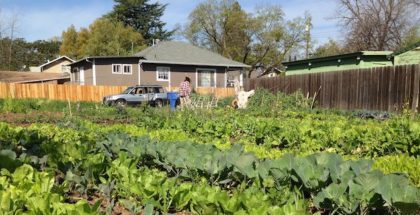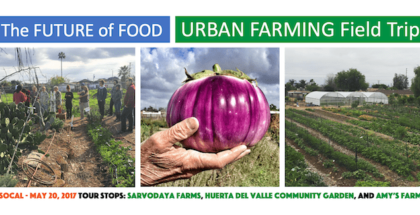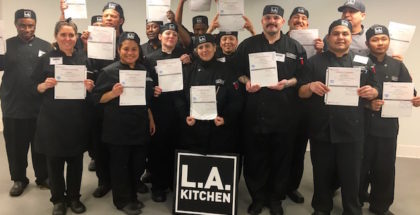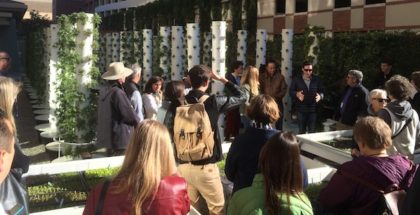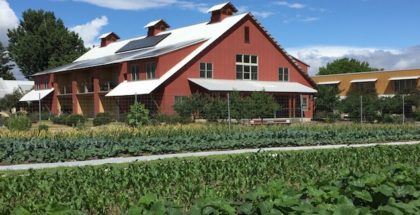Conference News
UC Cooperative Extension Offers Urban Farming Workshops in San Diego and Sacramento
March 12, 2018 | seedstockUrban farmers and those considering farming in an urban area are invited to participate in a series of four day-long low-cost workshops offered by University of California Cooperative Extension (UCCE) advisors and other experts in both the San Diego and Sacramento regions. Farmers and potential farmers can take one or take all four of these workshops; each is $20 for a full day of expert speakers, participatory exercises, lunch and refreshments. The workshops will be held at urban farm sites and will include farm tours and discussions with local urban farmers sharing challenges and success stories. The 2018 workshop series starts March 16 in the Sacramento area and March 23 in the San Diego area. Read More
‘Future of Food’ Urban Farming Field Trip to Explore Urban Ag Endeavors in Inland SoCal
April 4, 2017 | Robert PuroSlated for Saturday, May 20, 2017 the ‘Future of Food – Urban Farming Field Trip’ will visit a series of innovative urban farming ventures in Inland Southern California that have emerged to grow the local food marketplace, increase food access, educate local communities, advocate for food equity, and improve health and nutrition. The field trip hosted by Seedstock, a social venture that seeks to foster the development of sustainable local food systems, will also include lectures from experts in urban farming.
The tour is the third in a series of Seedstock ‘Future of Food’ field trips that was recently launched to facilitate the exploration of food system innovations that are generating economic and community capital. Read More
California Farmers Face Challenges in Wake of Trump Administration Deportation Policy
April 3, 2017 | Charli EngelhornThe 2004 film A Day Without a Mexican presented a scenario in which fresh produce from California’s farms were being sold on the black market and out of car trunks as a consequence of the sudden disappearance of the country’s Mexican population. Although satirical in nature, the message behind the film is becoming more relevant due to recent Trump administration policies regarding immigration and deportation.
According to statistics from the Farm Labor Survey of the USDA’s National Agriculture Statistics Service, in 2012, there were nearly 1.1 million farm workers, on average, working on the 2.1 million farms in the United States. Of those workers, approximately 50 percent were undocumented laborers. This percentage increased when broken down into specific crop production, with undocumented workers accounting for 67 percent of farm workers in the fruit and nut industry and 61 percent in the vegetable industry compared to nine percent and 17 percent, respectively, of farm workers who were U.S. citizens. Read More
In Fight Against Food Poverty, L.A. Kitchen Embraces Imperfect Fruit and Intergenerational Workforce
March 21, 2017 | Charli Engelhorn
Robert Egger, founder and CEO of L.A. Kitchen, a non-profit in Los Angeles that engages, empowers, and nourishes the local community. Photo Courtesy of L.A. Kitchen. Photo Credit: J Wiley Photography.
Fighting hunger is more than just about food for Robert Egger, founder and CEO of L.A. Kitchen, a non-profit in Los Angeles that engages, empowers, and nourishes the local community “by reclaiming healthy, local food that would otherwise be discarded, training men and women who are unemployed for jobs, and providing healthy meals to fellow citizens,” according to the organizations mission statement.
“Fighting hunger is a political act, a social act, an economic act,” says Egger. “I want to be a source and develop a model that shows how you can feed more people a better meal with less money.”
L.A. Kitchen is modeled after Egger’s first enterprise, D.C. Central Kitchen in Washington D.C. A chance experience of accompanying friends to feed the homeless there highlighted some inadequacies Egger couldn’t ignore, such as purchasing the food when so many people in the food industry he knew lamented over wasting food at the end of the night. Read More
‘Future of Food’ Field Trip Explores Commercial and Community Driven Urban Farms in Los Angeles, CA
January 30, 2017 | Robert Puro
Attendees of the Seedstock ‘Future of Food – Urban Ag Field Trip’ at USC Teaching Garden, learning about the farm’s aeroponics operations from LA Urban Farms’s Wendy Coleman and Niels Thorlaksson. Photo credit: Robert Puro, Seedstock.
On Friday, January 27, Seedstock hosted the inaugural ‘Future of Food – Urban Ag Field Trip’, which provided attendees an excursion into the diversity of urban farming and state-of-the-art hydroponic, aquaponic and aeroponic agriculture operations in Los Angeles County, the most populous county in the U.S. The sold out tour treated participants to lectures and sessions from pioneering farmers who are embracing innovative business models and growing systems to both increase food security and take advantage of the escalating demand for local food.
The tour kicked off with a stop at The USC Teaching Garden, a joint venture between L.A. Urban Farms and USC Hospitality, which utilizes aeroponic tower gardens to challenge the food systems status quo on campus. The garden was established to supply fresh produce to the university’s on-campus restaurants, dining halls, catering services, and hotel, while also teaching students and staff about flavor and sustainability. Attendees heard from Chef Eric Ernest, Executive Chef of USC Hospitality, discuss the economic viability of the garden. Chef Ernest noted that the garden is not just for show, and that its 90 aeroponic garden towers grow enough food for campus retail units to break even each year. “The garden is about connecting chef and customer,” said Chef Ernest. We also heard from L.A. Urban Farms founder Wendy Coleman, and partner Niels Thorlaksson, discuss the technical details of the farm, its water usage, and maintenance requirements. Thorlaksson explained that each aeroponic garden tower utilizes 5 – 10 gallons of water per week. Read More
SoCal Urban Farming Org Increases Supply of Fresh Produce to Homeless Shelter by Healing Soil and Residents
January 24, 2017 | Charli Engelhorn
Velva, an employee of GrowGood, a CA-based nonprofit that has been working with the Salvation Army since 2011 to develop a garden-based program for the residents of the Bell Shelter that uses healthy food and gardening as a catalyst for healing. (Photo courtesy of GrowGood. Photo credit: Amy Gordon.)
Prior to the establishment of the GrowGood urban farm on a lot across the way from the Salvation Army Bell Shelter located in Bell, CA, the shelter, which serves nearly 6,000 meals per week, incorporated very little fresh produce into its menu.
“They were spending cents per meal on fresh produce. Food was donated, so no one was going hungry; but the nutritional quality was often low,” says Brad Pregerson, co-founder of GrowGood, a CA-based nonprofit that has been working with the shelter since 2011 to develop a garden-based program to not only increase the supply of fresh produce to the shelter, but also to provide its residents with meaningful work and act as catalyst for healing.
The Salvation Army Bell Shelter, which opened in 1988, was established with help from Pregerson’s grandfather, Harry, a federal judge and veteran, who perceived the dire need to provide housing for the growing Read More
Innovative Neighborhood Farm Adjacent to Housing Complex Increases Food Access and Grows Community
January 16, 2017 | Trish Popovitch“Beyond growing vegetables, beyond growing soil, we’re building community through agriculture,” says Dave Victor of Orchard Gardens Neighborhood Farm and Community Garden. “That’s a big part of the mission, a big part of the vision for the farm. It’s all about providing healthy fresh local food for low income people.”
Dave Victor, after five years honing his growing skills with Garden City Harvest, became the manager of Orchard Gardens Neighborhood Farm just last year and he couldn’t be happier with his new position.
“Just like any sustainable agriculture farmer the focus is on building soil,” says Victor. “I tell people that I’m a vegetable farmer but first and foremost it’s all about growing soil and building that soil ecology.” Read More
Coalition Fights Food Waste to End Hunger in Orange County, CA
January 9, 2017 | AJ HughesWhen Santa Ana, California pediatrician and Orange County Public Health Officer Eric Handler ran into Mark Lowry of the Orange County Food Bank some years ago, he had two questions for him:
- Do you have enough food in your food bank?
- If we captured all food waste, could we end hunger in Orange County?
Lowry’s answer to the first question was no, and his answer to the second question was yes. This interaction led to the formation of the Waste Not OC Coalition in 2012.
With an overarching goal to eradicate hunger in Orange County, the Waste Not OC Coalition recovers food by connecting restaurants and grocery stores with food recovery agencies. It distributes that food by connecting people in need with food pantries. It also educates donors, recipients and the general public about the importance of food donation and how to safely handle donated food. Read More

